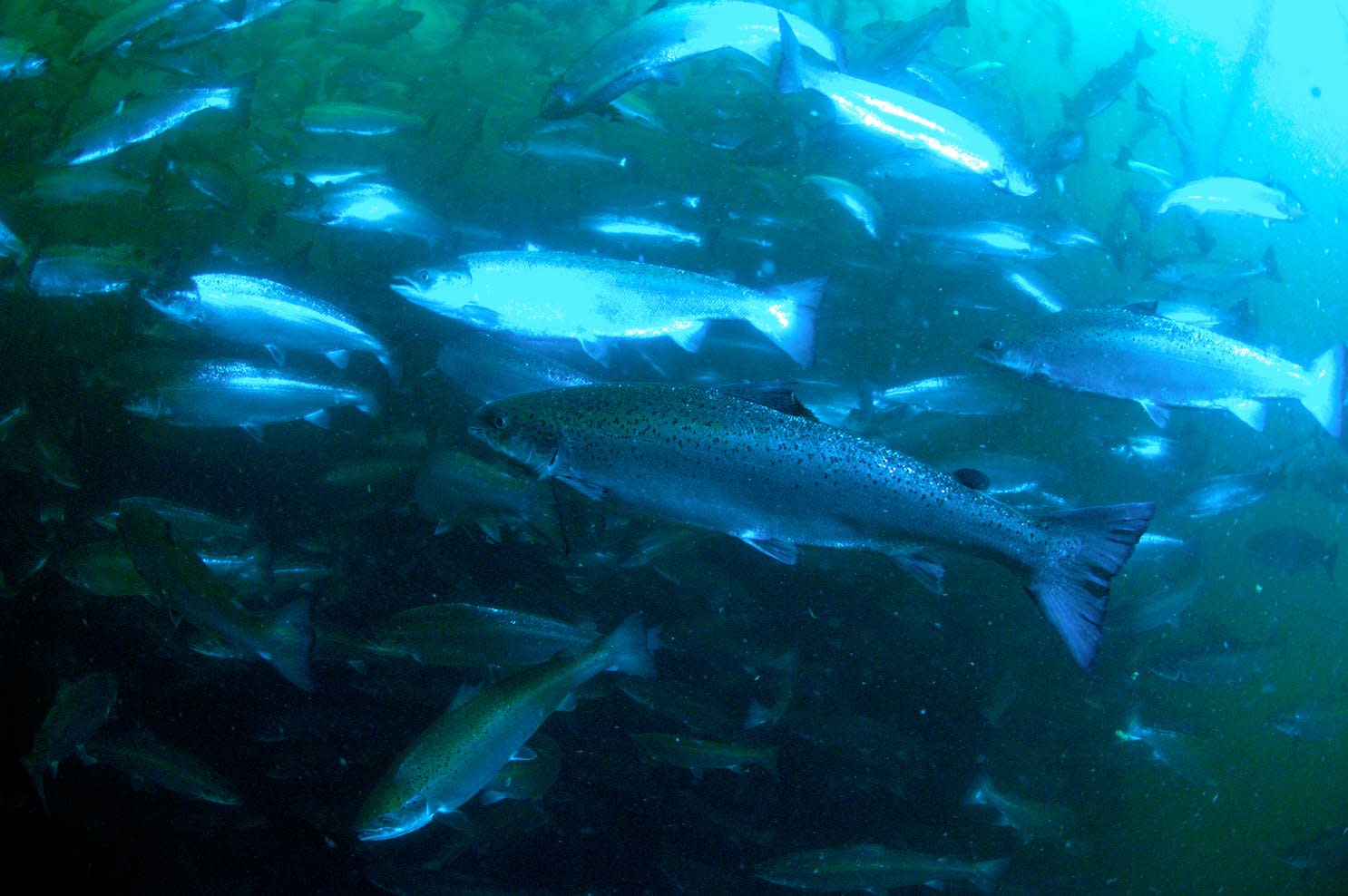




Why you should consider leaving fishes off your plate and what the alternatives are.

Fish and chips is a cherished British meal, symbolic of a trip to the seaside or a Friday night treat. But as growing research proves fishes’ intelligence, and with huge numbers suffering in intensive fish farms, the evidence suggests we should give up eating fish.
Because they’re often measured in tonnes, it can be hard to imagine just how many fishes are killed for food. Even when we estimate numbers, they’re so huge it’s easy to forget the individual animals behind the stats.
Trillions of fishes are killed and consumed by humans every year; up to 77 million are farmed and slaughtered right here in the UK.
Despite common belief that the fish we eat is always freshly caught by local fishermen, who sail out into the stormy sea every day, the vast majority come from intensive fish farms. This system is known as aquaculture - and there are many welfare issues for the animals raised within it.
Do fish feel pain?
Perhaps the biggest reason to stop eating fish is that they feel pain, and when they’re raised for food, they’re subjected to a lot of it.
People have been questioning for a long time whether fishes feel pain, but gone are the days when the answer was unclear.
Because fishes can’t scream out when fishermen hook them, and don’t cry tears when they’re pulled out of water, many humans assume that they don’t suffer. But scientists, veterinarians, and researchers are certain that they can, and do, feel pain.
If we look closely at the behaviour of fishes, and look beyond our human-centric understanding of pain responses, we can see that they react when exposed to painful or harmful stimuli. In a study by Garner and Nordgreen, fishes responded to exposure to high heat by wriggling profusely and trying to distance themselves from the hot object. Plus, a group of the animals who were given a dose of morphine showed normal behaviour following the painful encounter. This indicates that the painkillers worked, implying pain is a very real experience for fishes.
It’s time to stop asking if fishes feel pain - and time to stop causing them pain, too.
An obvious example where fishes are subject to pain is during recreational fishing. But even if you don’t spend your time fishing by a lake, you could still be contributing to their suffering.
Do fishes suffer for food?
For wild-caught fish, the trauma of being hooked on a fishing line or suffocated in a net is undeniable. And there are a plethora of welfare issues with intensive fish farming too.
Although farmed fishes are covered by the basic principle of our animal welfare legislation, stating that they should be spared unnecessary suffering, they lack any further detailed guidelines or regulations that ensure they’re being treated as humanely as possible.
In aquaculture farms, fishes are denied their natural instincts, and crammed into filthy cages, where disease and injury is rife. Some are effectively eaten alive by lice as they endlessly circle the same polluted water.
The most farmed fish in the UK is the salmon, which is farmed predominantly in Scotland. All across the UK, the law is simply not robust enough surrounding slaughter for fishes to minimise suffering. This means that farmers can legally kill fishes without rendering them unconscious first, causing immense pain for these poor animals.
If fishes are not stunned, their deaths can be some of the most appalling of any farmed animal. Farmers may leave them to bleed out after slashing and removing their gills, gut them alive, or leave them to suffocate and chill to death on ice, which can take hours. This is extreme suffering, and the fact that it’s legal is abhorrent.
Here at The Humane League UK, we’ve written to the English and Scottish Government to request detailed legal requirements are made for fishes to make it abundantly clear that they must be effectively stunned prior to slaughter.
In the meantime, you can help end the cruelty too. You can refuse to support this horrific suffering by keeping fishes off your plate.
Do fish matter?
The scale of suffering of aquatic animals cannot be ignored. Fishes have been largely neglected in the past, in favour of animals considered more ‘relatable’ such as pigs or cows. Because it is easier to empathise with these animals, they are often the focus of animal protection organisations’ campaigning efforts.
But fishes matter too.
Another great reason to give up eating fish is that they are amazing, intelligent animals. They really are “friends not food!”
Some of our favourite fish facts are that they have been known to use rocks as 'tools' and form bonds with one another. Some are even self-aware and have even been known to attempt to remove marks on their own bodies when looking in a mirror! So cute.
To find out more on why fishes deserve our compassion, you can watch an interview with our Campaign Coordinator, Maddy, who is leading on our fishes campaigning.
“But eating fish is healthy!”
Many people eat fish for its purported health benefits, primarily omega-3 fatty acids.
However, some fishes contain high levels of mercury - a toxic compound - which they absorb into their bodies due to water pollution. Mackerel, tuna, and cod are among some of the fish species with the highest rates of mercury. This has been linked to serious health problems, as the toxins interfere with the animals’ neurological and hormonal systems.
There is also growing concern over microplastics: tiny pieces of broken down plastic residue, which is found in both the ocean and freshwater.
Because these compounds are so small, they are ingested by animals, including those who end up in the human food chain. Microplastics, and even smaller particles called nanoplastics, move from a fish's stomach to their muscle tissue, which is the part that humans typically eat. Indirectly, and often unknowingly, humans are consuming these little pieces of plastic.
Can eating farmed fishes avoid the risk? Sadly not. For every 1kg of salmon farmed, at least of 1.2kg of fish meal and oil is needed - and this comes from ocean fishes.
More research is needed to fully understand how ingesting microplastics impacts human health, but the safest bet is to leave fishes off your plate.
“But I enjoy the taste of fish!”
We get it - no one wants to give up the taste of food they enjoy! But fear not. From plant-based ‘scampi’ bites to faux tuna to fishless fingers and prawn-style pieces, the alternatives to consuming fish are better than ever. Plus, vegan ‘seafood’ is a growing industry, with more delicious creations sure to be hitting supermarket shelves and restaurants soon!
What next?
The evidence is clear: it's better for you and for fishes to leave them off your dinner plate (or breakfast and lunch plates, for that matter!).
Want to make a difference for animals? Join thousands of others and start by signing the petition below, it'll only take a moment.

 Lauren Wills
Lauren Wills





